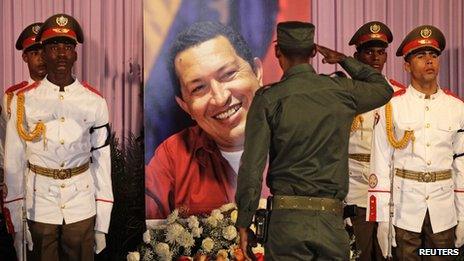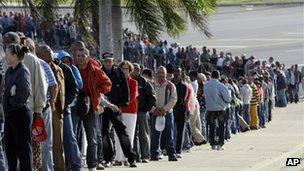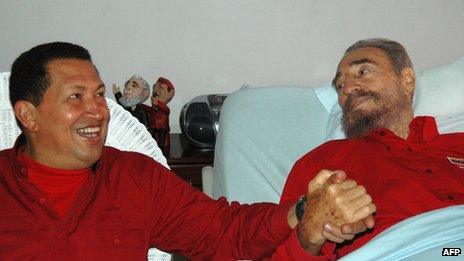Cubans mourn 'comrade Chavez' as one of their own
- Published

Flags on Cuban state buildings have been lowered in Hugo Chavez's honour and all music has been switched off in public places
Cuba is mourning the death of Hugo Chavez as one of its own. Flags on all official buildings have been lowered in his honour for three days; the music in bars and restaurants, switched off.
On Friday, the military will fire a 21-gun salute from the Havana fortress.
Cuban state TV is full of images of a young and healthy Chavez amid adoring crowds, hugging his supporters and the header of the island's Communist Party newspaper, Granma, is now black instead of red.
"He was a great friend to Cuba, he helped us a lot," explains Eduardo Leon, hawking the black copies of Granma on a cobbled street corner. "He was close to Fidel and Raul [Castro]. Cuba will miss him like a son."
It is that bond between Chavez's Venezuela and the Castros' Cuba that explains both the depth of sadness at his death here, and concern for the future.
In Havana on Thursday thousands joined a queue that stretched across the city's vast Revolution Square, past the iconic image of Che Guevara, and curled around the corner.
They'd come to file past a picture of Chavez propped amid flowers and flanked by a military honour-guard.
Many people had been bussed in from state enterprises; one man apparently came straight from a building site, spirit level still in hand.
The line moved quickly and there were few obvious tears. But those involved expressed real sadness.
"All the Cuban people liked Hugo Chavez very much," Asela insisted. "He was a leader not only in Venezuela, but in the world."
"For us, Chavez is Cuban. He's another comrade like Fidel, like Raul," Pedro Pedroso added, emerging from the memorial.
Revolutionary heir
Other visitors hailed the Venezuelan's 'anti-imperialist' politics, initially a trademark of Fidel Castro; they praised Chavez's focus on helping the poor and his dream of a strong and united Latin America.
In many ways he was the revolutionary heir of Fidel - though the sick 'father,' now 86, has outlived him - and that political alliance brought benefits.
When the Soviet Union collapsed in 1991, Cuba's economic lifeline was suddenly cut with dramatic consequences: there were blackouts, food shortages, no fuel.
The system's survival through the great hardships of what was known as the 'Special Period' owes much to Chavez and his support.

Thousands of Cubans from across the country queued to visit a memorial for Hugo Chavez in Havana
Two decades on, Cuba gets two thirds of its oil from Venezuela at highly preferential prices. Economists say the island pays with the services of some 40,000 state-employed doctors, sports trainers and military advisers.
Cuba benefits most financially, though its medics have been central to helping Chavez realise his socialist project in Venezuela, bringing health care to poor, remote areas in particular.
So the official statement issued here on Chavez's death praised his 'extraordinary generosity', especially during the difficult 1990s.
Before travelling to Havana for what would be his final operation, Hugo Chavez signalled Nicolas Maduro as the man to succeed him. A known friend of Cuba, he spent a good deal of time here during Chavez's most recent illness and treatment.
But his election opponent will be Henrique Capriles, who last year vowed to end the 'free oil' flowing out of Venezuela for its allies.
No wonder many Cubans are hoping for political continuity, in Caracas.
"If Maduro is President, we'll be ok," says Orlando Ochoa, a music promoter.
"We've relied a lot on Venezuela like we did on the Soviet Union years ago. I don't think we'll face another Special Period. I hope not. But this situation could affect us," he believes.
Economic progress
Cuba's state economists argue the island is better placed to weather the gathering storm now, than in the '90s.
"Of course Venezuela is very important for Cuba - maybe 35% of our economy is with them - but we are trying to diversify our economy, our partners," Juan Triana told the BBC in a recent interview.
"In the '90s we had only sugar and the USSR," he points out. "We have developed a lot in 20 years: biotech, telecoms, tourism - we have different engines for the economy."
That process is likely to accelerate now, given new impetus by the uncertainty in Caracas. The so-far slow expansion of the private sector in Communist Cuba may also pick up pace.
"I am worried about the situation in Venezuela, like every Cuban, but I am sure we can resist," Juan Triana adds.
Despite his close ties with Hugo Chavez, Fidel Castro had made no comment on his protege's death by Thursday night. Fidel has been sick and frail for some years.

The strong bond between Fidel Castro (r) and his protege brought many benefits to both countries
But on Thursday his brother Raul visited a memorial to Chavez in eastern Cuba.
"You could speak for days about Chavez," Cuba's President remarked, after leaving a single white rose beneath his photograph in Santiago.
"But the most important thing is that he died unbeaten, victorious," he said, declaring that Chavez had "entered through the great door of history".
"It's sad, because Chavez supported us in our worst moment and we had a close relationship with Venezuela," says Rafael Hernandez, out for a stroll in the unusually music-free streets of Old Havana.
All sound systems are off until Saturday.
"Everything changed here after Chavez. Now it depends on the government of Venezuela and what they decide," he says.
"We are Cuban, so we're always concerned - now even more than before."